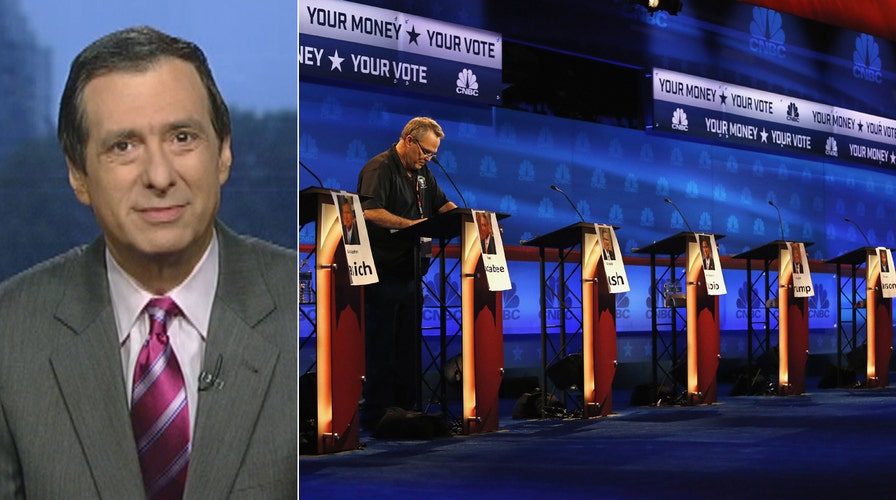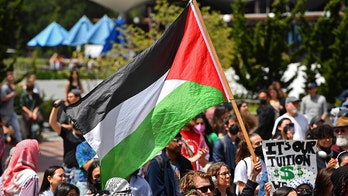Kurtz: Handicapping the CNBC debate
'Media Buzz' host previews what to watch for in GOP presidential debate
Jeb Bush may have cooler things to do than mix it up in tonight’s Boulder bash, but he’d better come to play anyway.
The former governor is riding a huge wave of bad press after slashing campaign spending and sounding petulant about the campaign ordeal, telling an audience he could be doing better stuff and to “elect Trump” if they want entertainment and gridlock. It was the opposite of the joyful run he had promised, and there are even dumb, unfounded rumors that he might drop out.
So Bush not only needs a strong performance at the CNBC debate in Colorado, he needs to do well in the spin cycle that follows these faceoffs.
The Republican debates have assumed an outsize importance this year. First, there are so many candidates that they are having an unusually strong winnowing effect (remember Scott Walker?). Second, they are drawing massive audiences, 24 million and 23 million for the Fox and CNN debates.
And third, there are so few of them that each one has a Super Bowl quality. The once-a-month schedule is the brainchild of the RNC, which thought fewer debates would help the party consolidate around a front-runner. But in a cycle dominated so far by Donald Trump and Ben Carson, it’s having the opposite effect.
Jeb just hasn’t looked comfortable on stage in either debate, and now that he’s sunk to single-digit status, he’s under enormous pressure to punch his way back into contention. He knows policy inside out but his message is diffused by a diffident manner.
Trump, who no one would accuse of being low energy, will need to deal with his emboldened rivals as well as the CNBC moderators. He can’t just be seen as reciting his greatest hits on Mexico, China and our incompetent leaders. The debate’s focus, jobs and the economy, should play to his strength.
But he is trailing Carson for the first time, 26 to 22 percent in yesterday’s New York Times/CBS poll, which has a symbolic value even though it's within the margin of error. (Even more noteworthy is that 55 percent of Trump supporters in the survey said they are firmly behind their man, while 80 percent of Carson backers said it’s early and they could change their minds.)
Trump will be standing next to Carson, but attacking the doctor will call for surgical precision, and The Donald tends to favor blunt instruments.
Carson is generally overshadowed on a debate stage. He is soft-spoken, low-key, occasionally witty, but doesn’t interrupt or deliver zingers. He avoids what he calls the “mud pit.” And yet, that doesn’t seem to hurt him at all. In fact, Carson’s quiet dignity may be precisely what his fans like.
Marco Rubio has had two solid debates, but they haven’t given him much of a bump. He is drawing more attention now—Rubio is third in that CBS poll, with 8 percent—and is a better communicator than Bush in front of an audience. But with that poll rise may come tougher debate questions, perhaps including the Washington Post report that he can’t stand the Senate and so wants a promotion.
Carly Fiorina may be the best debater in the bunch, having fought her way into the CNN debate, won it hands down and then catapulted herself into the top tier. But the former CEO’s surge didn’t last, and she seemed to fade from the political conversation since the Reagan Library event. She will surely try to elbow her way back into the spotlight.
As will the others. Ted Cruz, Chris Christie, John Kasich, Rand Paul and Mike Huckabee haven’t gotten much time in the earlier debates, and they will be looking to seize a breakout moment. In a Trumpian media environment, there just aren’t many opportunities to reach the whole country.
A couple of the candidates who don’t score well in Boulder—or at the Fox Business Network event in Milwaukee on Nov. 10—may not be with us much longer. That’s why the stakes are unusually high in this third presidential debate.





